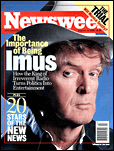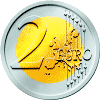 |
 Econ 92 Syllabus |
 Econ 52 Syllabus |
 Euro Article Index |
The Euro: No Worries in Washington: page 2
The dollar's strength or weakness, in fact, is not a decent indication of America's international influence; other matters, like the size of its military power, matter just as much. Ask the Poles, Czechs and Hungarians. The euro, remember, is a currency used by 11 West European members of the European Union. It was conceived as a direct response to the events of 1989, Europe's year of miracles, when the Soviet empire east of the Iron Curtain collapsed. Between 1989 and 1993 a complicated grand bargain was struck: Germany would be unified but, to show that it was a good European, would give up its beloved Deutsche mark; Washington would not rub Moscow's nose in its own failure, and the ex-communist nations of East and Central Europe would be granted a double security blanket—a promise of early membership in the EU, and military protection by the United States through membership in NATO.
Hence the events of this spring, when Poland, Hungary and the Czech Republic will become full members of the North Atlantic alliance. The oddity is that the timetable for their membership in the EU has slipped. When Helmut Kohl lost the German election last fall, the nations to Germany's east lost their greatest European champion. Gerhard Schröder, Kohl's successor as German chancellor, is anxious to reduce his nation's contribution to the EU's budget; unless a deal on that is done soon, he has said, the ex-communist countries will have to wait a while for EU membership. On a visit to Paris last week, Polish Foreign Minister Bronislaw Geremek tartly said, "We are ready to become members of the European Union in 2002 or 2003. The problem is whether the EU is ready."
In Central Europe, there is still reluctance to judge Schröder too harshly. "I don't want to send out the wrong signals," says Michael Zantovsky, the chairman of the Czech Senate's foreign-relations committee. "Schröder will have to show if he will follow in [Kohl's] footsteps." But if the German government means what it says, Europe will soon look an odd place. To the west of the old Iron Curtain will be Euroland, rich and self-confident; to the east of it will be countries who will be members of NATO, but not the EU—who will look not to Paris, London or Berlin for their security, but Washington.
In good times, when all of Europe is quaffing champagne on a Monday morning and the Dow is reaching new highs, none of this matters much. In bad times—ever noticed the state of the large country to the east of Poland?—it will. Whatever the value of the dollar.
With Andrew Nagorski in Berlin
Newsweek, January 18, 1999
 |
 Econ 92 Syllabus |
 Econ 52 Syllabus |
 Euro Article Index |